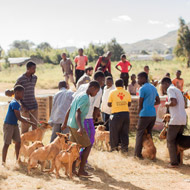
Practices advised to contact local authorities
With concerns rising about the potential for rabies to enter Britain through the illegal importation of animals, the BSAVA are urging vets and pet owners to work together to eliminate this devastating disease.
Rabies is a global problem that leads to the suffering and premature deaths of thousands of people and dogs, so understandably there is concern whenever a case is reported in Europe.
BSAVA president Tricia Colville said: "Of course, the public and the veterinary profession share concerns about the potential for rabies to enter Britain, particularly through illegal importation of susceptible animals.
"Responsibility for dealing with illegal imports rests with local authorities - usually Trading Standards or Environmental Health - and veterinary practices may wish to contact their local authority to ensure that they know how to report such cases before the need arises."
All animals entering the UK under the Pet Travel Scheme should have their documentation checked.
New rules were implemented at the end of last year in a bid to improve pet passport security and there is now a minimum age of 12 weeks for rabies vaccination. This, along with a requirement to wait 21 days before travel within Europe, means that any animal under the age of 15 weeks will not be compliant.
"If a veterinary surgeon in practice finds any suggestion of non-compliance they should inform Defra," adds Tricia.
As well as providing advice for pet owners and the veterinary profession in the UK, the BSAVA also supports organisations working to eradicate rabies overseas, such as the Worldwide Veterinary Service and Mission Rabies.
Through Mission Rabies, vets are working on the front line to eliminate human and canine rabies in India and Africa, where the disease is a daily reality for many communities.
In India alone, around 24 people each day suffer a painful death from rabies, and over half of those victims are children.
Luke Gamble, founder and CEO of Mission Rabies, explains: "Rabies is the world's deadliest zoonotic disease and it needs nailing. It's shameful that it still kills at least one child every ten minutes - as eliminating it - from anywhere in the world - it totally doable."
In just two years, Mission Rabies have vaccinated over 270,000 street dogs in global rabies hotspots, rabies-educated over 330,000 children and, with the help of WVS, have sterilised over 46,000 dogs.
"All this is spearheaded by the veterinary community, driving forward a one health project with direct action that could, should and will save tens of thousands of lives," said Luke.



 The Veterinary Medicines Directorate (VMD) is inviting applications from veterinary students to attend a one-week extramural studies (EMS) placement in July 2026.
The Veterinary Medicines Directorate (VMD) is inviting applications from veterinary students to attend a one-week extramural studies (EMS) placement in July 2026.